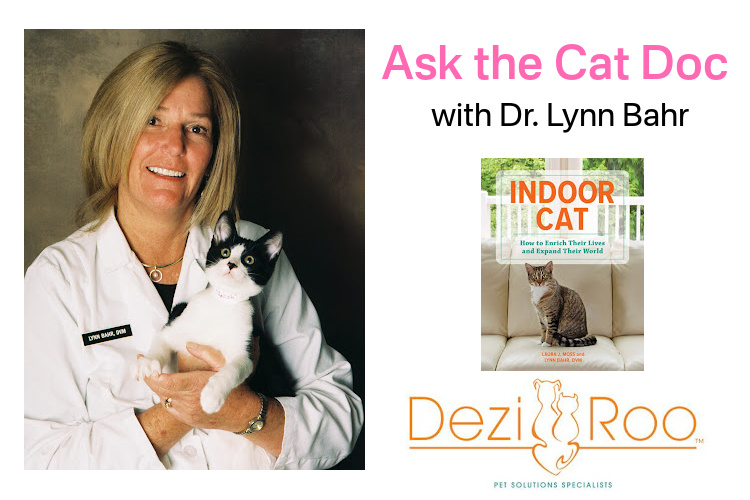
This post contains affiliate links*
Welcome to our regular “Ask the Cat Doc With Dr. Lynn Bahr” segment! Once a month, Dr. Bahr answers as many of your questions as she can, and you can leave new questions for her in a comment.
Dr. Bahr is a 1991 graduate of the University of Georgia’s College of Veterinary Medicine and founder of Dezi & Roo, a company that designs, manufactures, and sells solution-based products that enhance the lives of cats and their owners. She volunteers at numerous animal-related charities and causes and serves on the Fear Free Advisory Board, the Parliamentarian of the Society of Veterinary Medical Ethics, the Cat Committee of the Pet Professional Guild, and the Alley Cat Allies’ Feline Forward Task Force.
Dr. Bahr is co-author of Indoor Cat: How to Enrich Their Lives and Expand Their World, available from Amazon.
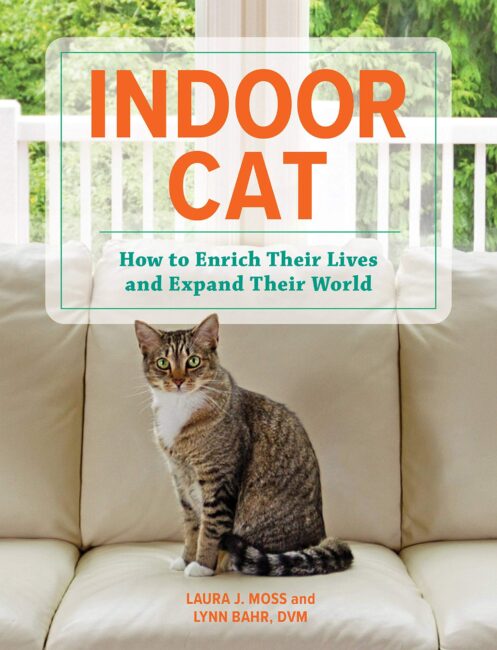
For more information about Dezi & Roo and their unique and innovative cat toys, please visit Dezi and Roo on Etsy.
We are pausing our Ask the Cat Doc for the next three months so Dr. Bahr can focus on Dezi and Roo as the holidays approach. She will be back in January to answer more of your questions, so feel free to leave questions in a comment!
Chronic rhinotracheitis
Hello Dr. Bahr, My 6 year old cat, Boo, has been diagnosed with chronic rhinotracheitis. He was born with it from a feral mother. I notice that when the weather goes below around 75 degrees, his eye waters terribly and he sounds stuffy when breathing and often snores.
I found a holistic product online called Lung Gold by Pet Wellbeing at Petco.com. It is quite expensive and has many natural ingredients. A vet from Cornell U told me they no longer recommend lysine to boost cat’s immune systems. Boo is a happy guy but sleeps a LOT. I want to give him any help I can to keep him healthy and comfortable. I plan on trying to feed him homemade cat food. Currently he eats Purina Cat Chow Naturals Grain Free dry cat food and get a couple of tablespoons of canned catfood each day along with brewers dried yeast tablets crushed into it for flea/tick prevention.
What do you recommend for chronic rhinotracheitis? Thank you! – Denise T
Hi Denise,
Thank you for being such a caring humom to Boo and for your concern about keeping him healthy all year long.
Chronic rhinotracheitis is just that – chronic – meaning that the symptoms can wax and wane for life. It is typically caused by infection from herpes virus type-1 (FHV-1) and a cat that has contracted it will have lifelong infection that usually stays dormant unless the cat is exposed to a stressful event, when the virus may reactivate. Cats suffering from active infections may experience symptoms related to respiratory problems, eye problems, and secondary bacterial infections.
Unfortunately, FHV-1 has no cure but there are many things that can be done medically or symptomatically to treat the signs of illness during acute episodes:
- Eyes and noses should be kept clean of discharge for the comfort of the cat
- Strong-smelling, moist canned foods stimulate the appetite, aid in maintenance of hydration and are gentler on sore throats than dry kibble.
- Treatment with a mist or saline nose drops may help remove dried and hard clumps of discharge
- Nasal decongestants or antihistamines can be used when warranted
- Eye ointment containing antibiotics or ocular lubricants may be helpful to prevent corneal ulcers
- Antiviral medications may be prescribed
- Antibiotics may be necessary in the event of secondary bacterial infections
Good nutrition (giving Boo more canned food than dry), sufficient hydration, lots of enrichment, exercise, and a stress-free environment will help boost his immune system and keep his FHV under control. As the weather begins to cool down, I would recommend you keep the windows closed and the house warm. Using a humidifier to add moisture to the air while the heat is on would be a good idea too. Speak with your veterinarian to discuss whether starting an antiviral medication or antihistamine would be appropriate in his situation. Being proactive before the weather dips below 75 degrees may help prevent his symptoms from manifesting or becoming a problem.
Since FHV-1 is so common I appreciate you writing in and giving me the opportunity to help not only you and Boo, but other readers as well.
Weight loss in cat with feline leukemia (FeLV)
Dear Dr,
My almost 6 year old tomcat is diagnosed with FeLV and is under regular treatment. Although he is stable right now, after two months of treatment for secondary infections, he is losing weight and is listless. I want to know of any alternative treatments that i may look into, apart from continuing with his regular mode. He has stopped drinking water, doesn’t ask to be fed so eats much lesser and isn’t enjoying his renal diet food. Please help.. I want to try everything possible to help him get back his energy and resolve. Kind regards, Dipika – Dipika Belapurkar
Hi Dipika,
I am so sorry to hear that your boy is doing poorly. While you mentioned that he is stable right now, I am deeply concerned that he is not drinking or eating well and is listless and losing weight.
Why is he on a renal diet? What regular treatment is he receiving? Has he seen a specialist? I would need to know the answers to these questions to better understand the situation before being able to give any advice. However, it sounds like his is in a dire situation that needs more medical attention now. Please take him back to your veterinarian to figure out what more can be done or seek a second opinion.
I am virtually sending you and your boy my thoughts, prayers, and healing white light.
*Purrs of Wisdom is a participant in the Amazon Services LLC Associates Program, an affiliate advertising program designed to provide a means for us to earn fees by linking to Amazon.com and affiliated sites. This means that if you decide to purchase through any of our links, we get a small commission. We only spread the word about products and services we’ve either used or would use ourselves.



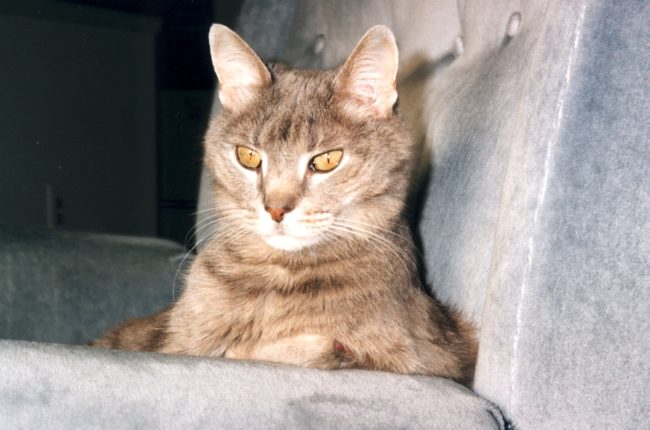
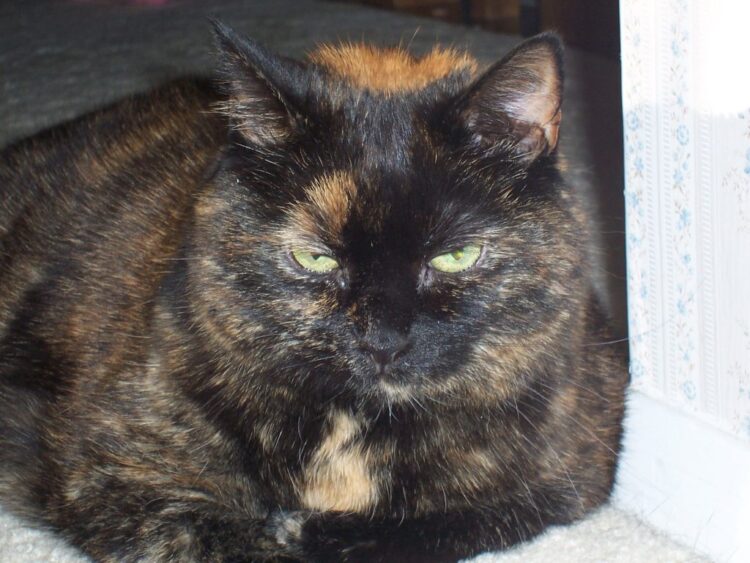
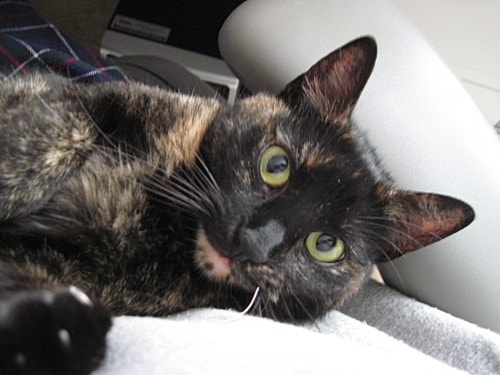
Hi. My cat, Max, had been suffering from a repeated anal relapse for a few months. During that time, we tried non-surgical ways to treat it, including doing the purse string procedure a couple of times and alternating between lactulose and miralax.
One of those prolapses was due to constipation. The following prolapsed, there weren’t signs of constipation, but I was told to continue with the stool softeners to help reduce any straining.
Finally, the only solution was for Max to get a coloplexy. I was told to continue the Miralax, but I feel that it’s too dehydrating for Max. What do you think about pumpkin pr psyllium husk?
Thanks for the info on Chronic rhinotracheitis. I wonder if this is what Pono had. My vet never did formally diagnose it. I can only assume it’s the same thing. The symptoms sound the same. It was worse during the cooler months, but it also acted up during high allergy months. So, we just thought it was allergies.